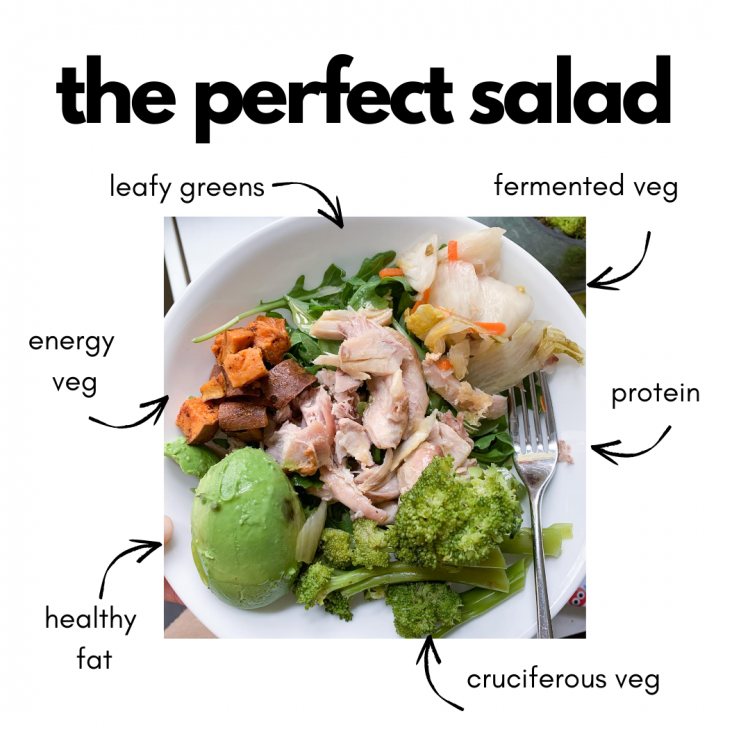If you’re taking the time to make a salad, why not make it work for you?
I’m all about building efficient meals that maximize nutrient density, gut-healing ability, texture and flavor. I follow this perfect salad formula for 99% of my lunches and many of my dinners as well. You just can’t go wrong if you stick with it!
Step 1: Choose a nutrient-dense, leafy green base. Greens are rich in chlorophyl, magnesium, folate, and beta carotene. They bind and remove toxins and heavy metals, promote vascular and skin health, support a healthy gut microbiome and boost the immune system.
- arugula
- baby kale
- spring lettuces
- romaine
- spinach
- chard
Step 2: Add a cruciferous vegetable. These veggies contain sulfur, which is naturally detoxifying. They help us get rid of excess estrogens and hormones that can lead to PMS, acne, PCOS, and certain cancers like breast and ovarian.
- broccoli
- cauliflower
- brussels sprouts
- kale
- cabbage
Step 3: Add a protein source, either plant or animal-based. Protein keeps you fuller, longer and helps repair muscles.
- canned fish (sardines, tuna, herring)
- rotisserie chicken
- leftover grass-fed steak
- hemp seeds
- organic tofu or tempeh
- canned chickpeas or black beans
Step 4: Add 1-2 healthy fats. Our brain is made up of 60% fat. We need fat to absorb the fat-soluble vitamins A, D, E and K. Fats also provide energy and support cell growth. We definitely need fat!
- 1/4-1/2 avocado
- 1-2 tbsp olive oil based dressing
- mayo (like Primal Kitchen or Vegenaise)
- 2 tbsp nuts or seeds (walnuts, pecans, sunflower seeds, pumpkin seeds)
Step 5: Add an energy vegetable. (optional – skip for low carb or keto). I call these “energy vegetables” because they are higher in carbs, the macronutrient that has the biggest impact of our blood sugar. For active people and athletes, these slow-burning carbohydrates are an excellent choice to keep you fueled. If you’re not very active or are trying to lose weight, try cutting back or eliminating these starchy vegetables until you reach your goal weight.
- roasted sweet potato
- baked potato
- beets
- winter squash (acorn, butternut, pumpkin)
Step 6: Add fermented vegetables. Fermented vegetables are considered “probiotics”, because they provide us with beneficial bacteria to support a healthy digestive tract. Over 70% of your immune system is in the gut, and over 90% of your serotonin (the feel-good neurotransmitter) is made in the gut! Adding a spoonful of fermented veggies to your salad can make a huge impact on your overall wellbeing.
- kimchi
- sauerkraut
- fermented pickles
- other fermented veggies
What are your favorite salad combos?

